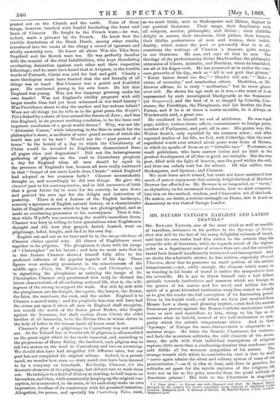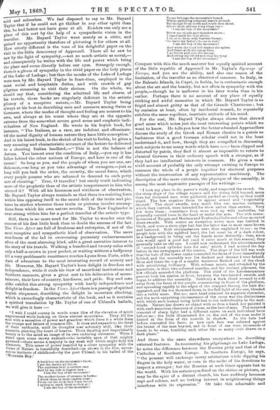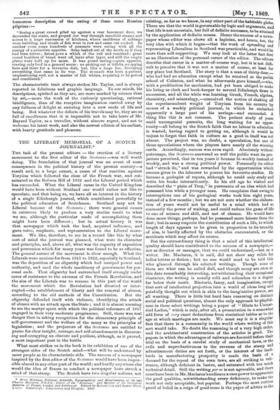MR. BAYARD TAYLOR'S EARLIEST AND LATEST TRAVELS.*
MR. BAYARD TAYLOR, one of the most vivid as well as sensible of travellers, intimates in his preface to the Byeways of Europe that this will be the last of his many delightful volumes of travel, and that his own tastes lead him rather to the artistic than the scientific side of literature, while he regards travel of the highest order as a department more of science than art, and for scientific travel feels himself insufficiently instructed and incompetent. And no doubt the admirable stories he has written, especially Hannah Thurston, show that he possesses no small portion of the artistic temperament ;—yet, oddly enough, the element which seems to us wanting in his books of travel is rather the sympathetic than the scientific. He is apt to throw himself into a half defiant attitude towards institutions and manners which are foreign to the genius of his nation and his creed, and seldom lets the spirit of a great historical institution wrap him round so closely as to give the reader the full conception of its fascinating power. Even in his boyish work,—of which we have just received from Messrs. Low a cheap and pleasing reprint, —you find the austere Protestant protest against the Roman Catholic institutions which were so new and marvellous to him, rising to his lips as he narrates what he beheld, instead of the half-inclination to sympathy which the artistic temperament elicits. And in these
byeways ' of Europe the same characteristic is observable in maturer shape. He visits the Grande Chartreuse, for instance, and feels the mountain solitudes, the cold cloisters of the monastery, the cells with their individual inscriptions of religious rapture, little more than a condensing chamber that condenses into cold dislike all the warmest sympathies of bis nature. The strange remark with which he concludes his visit is that be shall "never again admire the silent and solitary system of some of our penitentiaries ;"—as if, in idea at least, and often in practice, the solitudes set apart for the mystic raptures of the religious life were not as far as the poles asunder from the penal solitude of American prisons ! His visit to the Chartreuse is singularly
cold and colourless. We feel disposed to say to Mr. Bayard Taylor that if he could not go thither in any other spirit than this he had better not have gone at all. Readers can only see a place of this sort by the help of a sympathetic vision in the traveller. Mr. Bayard Taylor went merely as a critic, and gained no opportunity therefore of picturing it for others at all. How utterly different is the tone of his delightful paper on the visit to the little democracy of Appenzell. There all he saw he saw by the light of sympathy,—not so much artistic as moral,— and consequently he writes with the life and power which bring the place and scene directly before our eyes. Strangely enough, there is a gleam of sympathy in the vivid paper on the holy places of the Lake of Ladoga ; but then the monks of the Lake of Ladoga were seen by Mr. Bayard Taylor in feast-time, employed in the most social and hospitable duties, and with crowds of gay pilgrims streaming to visit their shrines. On the whole, we should say that, considering the admitted life and charm of his travels, these books are singularly deficient in the artistic pliancy of a receptive nature,—Mr. Bayard Taylor being always at his best in describing men and manners among Swiss or Germans, where the modes of thought and feeling are nearest to his own, and always at his worst where they are at the opposite extreme from the somewhat severe good sense and emphatic individualism of New England. He wrote in his boyish book, for instance, "The Italians, as a race, are indolent and effeminate. Of the moral dignity of human nature they have little conception." And in his latest book, in the sketch of his visit to Ischia, he gives a very amusing and characteristic account of the lecture he delivered to a cheating Italian landlord,—" This is not the balance of Astmea. You lament over the condition of Italy,—you say it has fallen behind the other nations of Europe, and here is one of the causes! So long as you, and the people of whom you are one, are dishonest,—so long as you take advantage of strangers,—just so long will you lack the order, the security, the moral force, which every people possess who are ashamed to descend to such petty acts of cheating." True, 0 traveller ! but surely truth indicating more of the prophetic than of the artistic temperament in him who uttered it? With all his keenness and vividness of observation, Mr. Bayard Taylor always reminds us that there is a resisting force within him opposing itself to the moral drift of the traits and pictures he studies wherever those traits or pictures involve assumptions from which his own nature revolts. The New Englander is over-strong within him for a perfect traveller of the artistic type. Still, there is no more need for Mr. Taylor to wonder over the success of his first little book than to doubt the success of the last. The Views Afoot are full of freshness and enterprise, if not of the most receptive and sympathetic kind of observation. The mere sturdiness of the lad in overcoming pecuniary embarrassments often of the most alarming kind, adds a great narrative interest to the story of his travels. Walking a hundred and twenty miles with only a half-a-crown in your pocket, or waiting without a halfpenny till a very problematic remittance reaches Lyons from Paris, adds a dash of adventure to the most interesting record of scenery and life. Moreover, Mr. Bayard Taylor's keen delight in freedom and independence, while it cools his view of sacerdotal institutions and Southern manners, gives a great zest to his delineation of mountaineers, their love of country, hardiness, and pride. Boy and man alike exhibit this strong sympathy with hardy independence and delight in freedom. In the Views Afoot there is a passage of spirited boyish eloquence, describing the delight in mountain climbing, which is exceedingly characteristic of the book, and as it contains a spirited translation by Mr. Taylor of one of Uhland's ballads, we will give it here :— " I wish I could convey in words some idea of the elevation of spirit experienced while looking on these eternal mountains. They fill the soul with a sensation of power and grandeur which frees it a while from the cramps and fetters of common life. It rises and expands to the level of their sublimity, until its thoughts soar solemnly aloft, like their summits, piercing the heart of heaven. Their dazzling and imperishable beauty is to the mind an image of its own enduring existence. When I stand upon some snowy summit—the invisible apex of that mighty pyramid—there seems a majesty in my weak will which might defy the elements. This sense of power inspired by a silent sympathy with the forme of Nature is beautifully described—as shown in the free, ninonseioua instincts of childhood—by the poet UhLand, in his ballad of the 'ountain Boy.' Compare with this the much maturer but equally spirited account of the little republic of Appenzell in Mr. Taylor's Bytwayte of Europe, and you see the ability, and also one reason of the limitation, of the traveller as an observer of manners. In Italy, its the Balearic Islands, in Capri, in Ischia, ho is enthusiastic enough about the art and the beauty, but not often in sympathy with the people,—though he is mellower in his later works than in his earlier. Perhaps there is no account of any place of equally striking and awful memories in which Mr. Bayard Taylor is so frigid and almost gritty as that of the Grande Chartreuse ; but by omission at least, often by incidental remark, he repeatedly exhibits the same repellent, inartistic attitude of his mind.
For the rest, Mr. Bayard Taylor always shows that shrewd good sense which notes just the most interesting points which we want to know. He tells you how the better educated Appeuzellers discuss the study of the Greek and Roman classics in a patois so barbarous that a good German scholar could not in the least understand it, and how, though they are compelled in discussing such subjects to use many words which have never been clipped and distorted by patois, they find it almost as impossible to return to classical German in their ordinary speech with a stranger, as if they had no intellectual interests in common. He gives a most vivid account of probably the only attempt existing in Europe to summon the whole of a people together for electoral purposes without the intervention of any representative machinery. The description of the mere externals, the physique of the assembly, is among the most impressive passages of his writings : " I took my place in the pastor's study, and inspected the crowd. On the steep slope of the village square and the rising field beyond, more than ten thousand mon were gathered, packed as closely as they could stand. The law requires them to appear armed and ' respectably dressed.' The short swords, very much like our marine cutlasses, which they carried, were intended for show rather titan service. Very few wore them ; sometimes they were tiod up with umbrellas, but generally carried loose in the hand or under the arm. The rich manufacturers of Trogon and Herisau and Teufon had belle and silver-mounted dross swords. With scarce an exception every man was habited in black, and wore a stove-pipe hat, but the latter was in most cases brown and battered. Both circumstances were thus explained to me: as the people vote with the uplifted band, the hat must be of a dark colour, as a background, to bring out the hands more distinctly ; then, since rain would spoil a good hat (and it rains much at this season), they generally take an old one. I could now understand the advertisements of 'second-hand cylinder hats for sale,' which I had noticed the day before in the newspapers of tho canton. The slope of the hill was snob that the hate of the lower ranks concealed the faces of those immediately behind, and the assembly was the darkest and densest I ever beheld. Here and there the top of a scarlet waistcoat flashed out of the cloud with astonishing brilliancy. With solemn music, and attended by the apparitors, in their two-coloured mantles, and the ancient pikemen, the few officials ascended the platform. The chief of the Landamminner present took his station in front, between the two-handed swords, and began to address the assembly. Suddenly a dark cloud seemed to roll away from the faces of the people, commencing in front of the platform, and spreading rapidly to tho edges of the compact throng, the hate disappeared, and the ten thousand faces, in the full light of the sun, blended into a ruddy mass. But no; each head retained its separate character, and the most surprising circumstance of the scene was the distinctness with which each human being held fast to his individuality iu the multitude. Nature has drawn no object with so firm a hand, nor painted it with such tenacious clearness of colour, as the face of man. The inverted crescent of sheaf, light had a different curve on each individual brow before me; the little illuminated dot on the end of the nose under It hinted at the form of the nostrils in shadow. As the hats had before concealed the faces, so now each face was relieved against the breast of the man beyond, and in front of me wore thousands of heads to bo seen, touching each other like so many ovals drawn on a dark plane."
And there is the same shrewdness everywhere in describing external features. In recounting his pilgrimage on Lake Ladoga, he notes the difference between the Russian piety and that of the Catholics of Southern Europe. In Southern Europe, he says, "the peasant will exchange merry salutations while dipping his fingers in the holy water, or turn in the midst of his devotions to inspect a stranger ; but the Russian at such times appears lost to the world. With his serious eyes fixed on the shrine or picture, or may be the spire of a distant church, his face suddenly becomes rapt and solemn, and no lurking interest in neighbouring things interferes with its expression." Or take this admirable and
humorous description of the eating of these same Russian pilgrims:— "Seeing a great crowd piled up against a rear basement door, we descended the stairs, and groped our way through manifold steams and noises to a huge succession of kitchens, where cauldrons of cabbage wore bubbling, and shoals of fish went in raw and came out cooked. In another room some hundreds of peasants were eating with all the energy of a primitive appetite. Soup leaked out of the bowls as if they had been sieves ; fishes gave a whisk of the tail and vanished ; great round boulders of bread went off, layer after layer, and still the empty plates were held up for more. It was grand eating,—pure appetite, craving only food in a general sense ; no picking out of tidbits, no spying here and there for a favourite dish, but, like a huge fire, devouring everything that came in its way. The stomach was here a patient, unquestioning serf, not a master of full whims, requiring to be petted and conciliated."
The characteristic trait always strikes Mr. Taylor, and is always reported in felicitous and graphic language. To our minds, his descriptions, spirited as they are, are more marked by science than by art,—more the work of the curiously questioning, rational intelligence, than of the receptive imagination carried away by any fullness of delight at entering into a new mode of life and being. But whatever the defects of his travels may be, they are so full of excellences that it is impossible not to take leave of Mr. Bayard Taylor, as a traveller, without sincere regret, and not to welcome his latest work, and also the newest edition of his earliest, with hearty gratitude and pleasure.
































 Previous page
Previous page